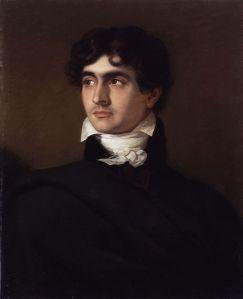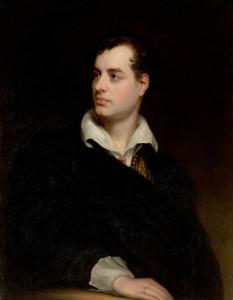Before the arrival of Bram Stoker’s Dracula on the literary scene in 1897, there was Lord Ruthven, “a nobleman, more remarkable for his singularities, than his rank.” Lord Ruthven’s origins and the story in which he appears germinated one infamous night in June 1816 at the same gathering that birthed the idea for Frankenstein.

John William Polidori
Portrait by F.G. Gainsford
John Polidori (1795-1821) had accompanied Lord Byron on his European travels, ostensibly as his personal physician. In 1816, Lord Byron (1788-1824) rented the Villa Diodati near Lake Geneva in Switzerland, where Mary Godwin Shelley and Percy Bysshe Shelley also spent part of the summer. In the introduction to the 1831 edition of Frankenstein, Mary Shelly recalled, “It proved a wet, ungenial summer and incessant rain often confined us for days to the house.” The party of budding literati spent an evening reading Fantasmagoriana, a French collection of German horror tales, which led to a challenge by Byron that they all try their mettle at penning a gothic tale.
Polidori would write “The Vampyre”, a short tale that marked the first instance of the modern vampire story, predating such Victorian gothic works as James Malcolm Rymer’s serialized Varney the Vampire (1845-1847), Sheridan Le Fanu’s Carmilla (1871), and of course Stoker’s Dracula (1897). Polidori’s story was published in April 1819 and was erroneously attributed to Lord Byron at first. More on that later.
In “The Vampyre”, Lord Ruthven with his “dead gray [eyes], which fixing upon the object’s face, did not seem to penetrate, and at one glance to pierce though to the inward workings of the heart” caused a stir of excitement among the ton. He is considered an aristocrat and moves among their set.
Crossing paths with Ruthven is a young gentleman, Aubrey, who had “cultivated more his imagination than his judgement” and thought “the dreams of poets were the realities of life.” While Ruthven appeals to the female sex and wins their attentiveness with a “winning tongue, he appears indifferent toward their efforts of vying for his attention. Aubrey, on the other hand, is lavished with the attention of those ladies striving for such a rich and handsome suitor for either themselves or their daughters and inflating his vanity and “false notions of his talents and his merit.”
Upon learning that Ruthven is about to travel abroad, Aubrey endeavors to follow in an effort to learn more about his “idol” and quench his curiosity. When Ruthven learns of Aubrey’s intention to travel, he invites the young man to join him.
In the course of their travels Aubrey observes “the eagerness with which [Ruthven] sought for the centres of all fashionable vice, and brought misfortune to those who may or may not have been worthy of it.”
“Though Aubrey was near the object of his curiosity, he obtained no greater gratification from it than the constant excitement of vainly wishing to break that mystery, which to his exalted imagination began to assume the appearance of something supernatural.”
While in Rome, Aubrey receives letters from his guardians urging him to leave Ruthven’s side as they have learned more about his character as “dreadfully vicious.” Thus awakened, Aubrey resolves to leave Ruthven, but before he does, he learns of Ruthven’s plot to sully an innocent girl which he is able to thwart.
Aubrey continues on his European tour on his own. In Greece, he encountered a sylph-life beauty, Ianthe. Aubrey would seek out sites of antiquity to visit, but his attentions would return to “an image that seemed alone the rightful possessor of his thoughts.” Ianthe. She captures Aubrey’s imagination with her innocence and beauty, and, in their time together, she relates to him a tale of vampires. Aubrey can’t bring himself to believe such tales, but he does note the striking appearance of vampires that would be accurate in describing Ruthven.
Foolishly, Aubrey sets off on an excursion that will take him through a particular woods feared by the local Greeks. Especially at night. And naturally, preoccupation causes him to lose track of time and get caught in the rain in that very forest.
Tragedy befalls Aubrey, and he narrowly escapes the clutches of a female vampire but suffers a fever. When he recovers, Ruthven is there. The two will later journey into more remote parts of Greece, resulting in Ruthven getting shot by bandits.
Ruthven elicits an oath from Aubrey to keep silent about his crimes and death for a year’s time. Ruthven’s body is later taken to the pinnacle of a nearby mountain and “exposed to the first cold ray of the moon that rose after his death.” Though when Aubrey later seeks out this spot, no body is found.
Aubrey returns to England and is greeted by his sister. Miss Aubrey has a melancholy charm resulting “from some feeling within, that appeared to indicate a soul conscious of a brighter realm.” Aubrey determines to protect his sister.
However, the oath he has made serves as a sort of geas that prevents Aubrey from speaking the truth of Ruthven’s nature until the precise hour when the term of the oath expires, but by then it may not be possible to avert another tragedy.
At times, this story requires a careful read. The language usage in its complexity makes for slow reading especially in the earlier parts of the story. Consider this example:
Aubrey observes Ruthven and “the very impossibility of forming an idea of the character of a man entirely absorbed in himself, who gave few other signs of his observation of external objects, than the tacit assent to their existence, implied by the avoidance of the contact: allowing his imagination to picture every thing that flattered its propensity to extravagant ideas, he soon formed this object into the hero of a romance…”
It did take a little re-reading and time to cogitate this and a few other passages to be clear on their meaning. But I’m glad to have read it. It’s important to read the origins, sources, and “that which has come before” in the literature and genres that one studies or writes about. Like many Greek myths, these lasting influences are referenced time and again in the works that have followed them.

Portrait of Lord Byron by Thomas Phillips, 1813
For instance, Polidori’s Lord Ruthven isn’t the first occurrence of a literary character by that name. Lady Caroline Lamb (1785-1828) previously used the name Lord Ruthven in her novel, Glenarvon, in 1816. The character was a thinly-disguised stand in for Lord Byron. And intentionally or not, I suspect Polidori was doing the same.
There are some interesting real-life comparisons to consider when reading the text of “The Vampyre.” Byron had left England because of a disintegrating marriage and unsavory rumors of disrepute and sexual perversions, including homosexuality. Polidori accompanied him as his personal physician and traveling companion. Consider Byron as Ruthven and Polidori as Aubrey, and the story takes on new layers of possible meanings. How much of Aubrey’s opinions and views of Ruthven may be based in Polidori’s experiences with Byron? We may never know. Polidori kept a journal of his travels with Byron, but one of his sisters is said to have censored “peccant passages” and destroyed the original before the journal’s posthumous publication in 1911.
When Polidori’s story was first released, it was thought to be written by Byron. A work by Byron would be a better selling point and using the familiar thinly-disguised Byron character Ruthven may have further confused matters. Byron would publish his own (unfinished) vampire story “A Fragment” in 1819 in an effort to clarify the erroneous attribution. It didn’t help that Polidori was partial inspired by Byron’s “fragment” to write his story, “The Vampyre.”
Regardless, Polidori’s story was a success. It soon influenced other works, including a stage adaptation Heinrich Marschner’s 1828 opera, Der Vampyr, and the aforementioned vampire novels. Alexandre Dumas even mentions the Lord Ruthven character in chapter 39 of his novel, The Count of Monte Cristo (1844).
More recently, a feature film adaptation of the story has been announced with a scheduled release in October 2019. It will be interesting to see if it does the story justice.
***
Links for more:
https://vampireresearchsociety.blogspot.com/2009/02/lord-byron-polidori-and-vampyre.html
https://en.wikipedia.org/wiki/The_Vampyre
Advertisements
